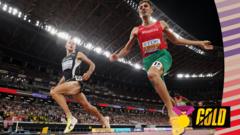Can Beamish's Dramatic Final Surge Secure Steeplechase Gold?

Published: 2025-09-15 13:35:27 | Category: sport
In a stunning turn of events at the World Athletics Championships in Tokyo, New Zealand's Geordie Beamish, despite a fall in his heat, managed to secure the gold medal in the men's 3000m steeplechase final. This victory denied defending champion Soufiane El Bakkali from Morocco a third consecutive world title, while Kenya's Edmund Serem claimed the bronze medal. Beamish's remarkable performance showcased resilience and determination, making this event one for the history books.
Last updated: 20 October 2023 (BST)
Key Takeaways from the Men's 3000m Steeplechase Final
- Geordie Beamish wins gold, showcasing remarkable comeback after a fall.
- Soufiane El Bakkali, the defending champion, finishes outside the medals.
- Edmund Serem from Kenya secures bronze, marking a strong performance.
- The race reflects the competitive spirit of the steeplechase event.
- Beamish's victory is a significant milestone for New Zealand athletics.
Race Overview
The men's 3000m steeplechase final at the World Athletics Championships is always one of the most anticipated events. This year, the stakes were particularly high as El Bakkali sought to defend his title for the third consecutive time. However, the race unfolded dramatically, with Beamish's performance stealing the spotlight.
Geordie Beamish: A Remarkable Performance
Geordie Beamish's journey to gold was not without its challenges. After falling during the heats, many spectators doubted his chances of securing a medal in the final. However, Beamish displayed exceptional tenacity, recovering quickly to deliver a performance that stunned both competitors and fans alike. His ability to navigate the challenging steeplechase barriers and water jumps with agility was crucial to his success.
The Role of Strategy in the Race
In the steeplechase, strategy plays a pivotal role. Athletes must balance speed with endurance while effectively navigating obstacles. Beamish's approach involved pacing himself early in the race, allowing him to conserve energy for a powerful finish. This strategy paid off, as he surged ahead in the final laps, securing his place at the front.
Defending Champion El Bakkali's Struggles
Soufiane El Bakkali, known for his formidable presence in the steeplechase, faced unexpected challenges during the final. Despite being a favourite to win, he struggled to maintain his usual pace and rhythm. This race highlighted the unpredictability of athletics, where even the most seasoned athletes can face setbacks on the day.
Keen Competition: The Bronze Medal
Securing the bronze medal was Edmund Serem from Kenya, who demonstrated his strength and skill throughout the race. Serem's performance added to Kenya's rich history in middle-distance running, showcasing the depth of talent that the country consistently brings to global competitions. His podium finish is a testament to his hard work and dedication.
Historical Context of the Steeplechase
The steeplechase has a rich history in athletics, combining distance running with barriers and water jumps. Originating in the UK, this event has evolved significantly, gaining popularity worldwide. The World Athletics Championships serves as a crucial platform for athletes to showcase their talents and set new records.
What This Victory Means for New Zealand Athletics
Beamish's gold medal represents a significant achievement for New Zealand athletics, marking a historic moment for the nation. It highlights the growing competitiveness of New Zealand athletes on the world stage, inspiring future generations to pursue excellence in sports.
Looking Ahead: Future Competitions
The outcome of this race sets the stage for future competitions, including the upcoming Olympic Games. Athletes will be keen to learn from this year's championships as they prepare for the next season. Beamish, El Bakkali, and Serem will undoubtedly be among the key competitors to watch, with their performances having significant implications for their careers and national pride.
As we reflect on this thrilling event, it raises questions about the future of the men's steeplechase. Will Beamish continue to build on this success? Can El Bakkali reclaim his title? The answers will unfold in the coming seasons, as athletes strive for greatness.
FAQs
What is the men's 3000m steeplechase?
The men's 3000m steeplechase is a track event that combines distance running with obstacles, including barriers and water jumps, over a distance of 3000 metres.
Who won the gold medal in the men's 3000m steeplechase at the World Athletics Championships?
Geordie Beamish from New Zealand won the gold medal in the men's 3000m steeplechase final at the World Athletics Championships in Tokyo.
What challenges do athletes face in the steeplechase?
Athletes in the steeplechase face various challenges, including maintaining speed while navigating barriers and water jumps, as well as managing their endurance over the distance of the race.
Why is the steeplechase significant in athletics?
The steeplechase is significant because it tests both speed and agility, showcasing athletes' versatility and contributing to the rich history of athletics as a sport.
What does Beamish's victory mean for New Zealand?
Beamish's victory is a landmark achievement for New Zealand athletics, highlighting the nation's growing competitiveness on the global stage and inspiring future athletes.



